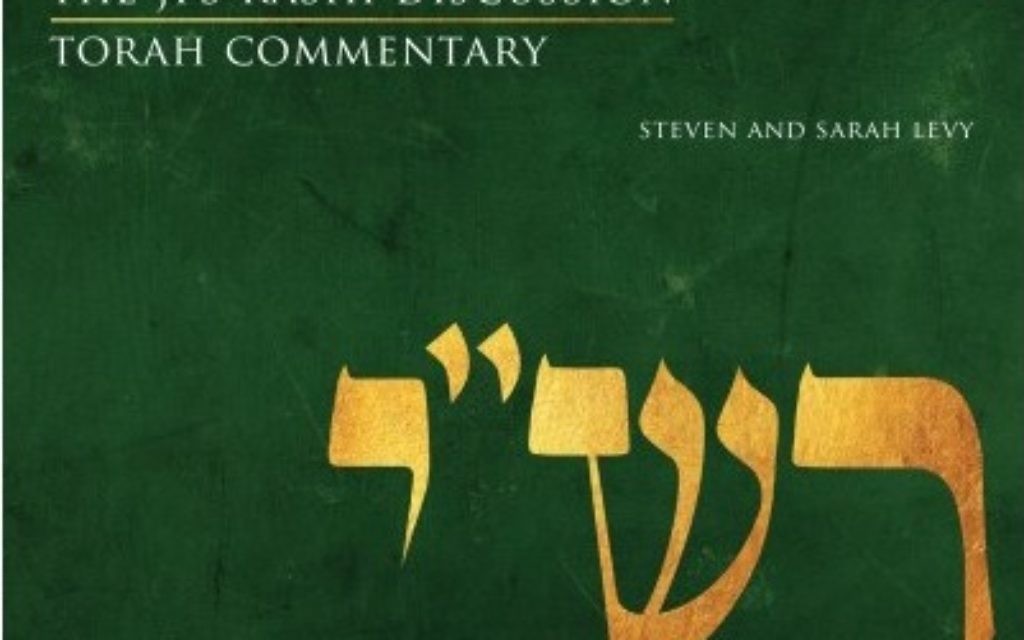A Book Better Than the Rabbi’s Sermon
Questions about Rashi's commentaries come from a couple who used to live in Atlanta.
I was skeptical when I heard about Sarah and Steven Levy’s book, “The JPS Rashi Discussion Torah Commentary.” The cumbersome title didn’t help, and the claim that contemporary Jews, including the young and the assimilated, can relate to every Torah portion that is read in the synagogue on Shabbat, week after week, didn’t fill me with optimism.
Boy, was I wrong.
When I received a copy of the book, I turned to the table of contents. We were starting the Book of Exodus in synagogue that week, so it made sense to see how the book dealt with Exodus’ first portion, Shemot.
Get The AJT Newsletter by email and never miss our top stories Free Sign Up
These were the topics the Levys chose for us to discuss from that section: “name-calling,” “growing up” and “courage of conviction.” I was intrigued.
For the next two months my husband and I followed the suggestions of the authors. We brought their book to our Shabbat table, each meal with a different group of guests (all ages and all backgrounds), and we opened the book at just the right time.
What’s the right time? It can be when there’s a lull in the conversation or when talk of current events becomes hot and heavy or when we get into what we can’t stand about other Jews. Rashi to the rescue.
So who is Rashi? Born in medieval France, he is considered the primary commentator on the Torah. His whole name is Rabbi Shlomo Yitzchaki (“Rashi” comes from the Hebrew initials of his name, resh, shin and yud).
The Levys use Rashi’s brilliance to generate lively discussions about our own lives. Selections of his insightful and often surprising ideas, translated into terse, clear and straightforward English, illuminate and explain interesting points and ask revealing questions about phrases and words in the Torah portion.
For each Shabbat meal, the Levys select and summarize a single Rashi comment. They then pose three provocative questions that bring Rashi’s insight to the present day.
After the presenter at the table reads a short selection from the Torah portion, followed by its Rashi comment (this takes only a minute or two), the fun begins. Over the weeks, our guests have been led to talk about tenacity, clothing, resentment, gender roles, miracles, Mr. Rogers’ philosophy, money and countless family issues.
Our discussions rarely stuck to the specific question, and on a couple of occasions we were so engrossed in meandering in, out and around the first question that we never moved on to the second or third.

Here’s one example from a Torah portion that comes toward the end of Exodus.
The Torah portion Vayakel mentions the appointment of two people, Bezalel and Oholiab, who supervise the construction of the Tabernacle the Jews use after they leave Egypt and wander in the desert.
Rashi points out that these two people who are to supervise the work come from very different backgrounds.
The Levys’ questions, picking up the theme of differing backgrounds:
- What do you know about your own family’s lineage?
- How did your forebears or others face challenges?
- Do you believe everyone has equal opportunities today?
People opened up. We heard amazing family stories that were startling, amusing and heartbreaking. There were anecdotes of resenting or embracing neighborhoods, schools and work with people unlike ourselves.
Interestingly, the third question, which easily could have provoked argument, produced thoughtful interchange instead.
Sarah and Steven Levy spent countless hours writing this book. It’s organized to be useful at the three Shabbat meals: the Friday night dinner, the Shabbat lunch and the late-afternoon Shabbat “third meal.”
To that end, they provide three selections from the weekly Torah portion — one for each meal — and each selection is followed by a related Rashi commentary. Then we get the three provocative Levy questions.
Bonus: At every meal we and our guests reviewed a small piece of Torah, and we learned a little Rashi.
Not only have we used the Rashi discussion book at our own Shabbat meals, but on two occasions we brought it with us when we went elsewhere. It always moved the conversations somewhere interesting and worthwhile.
Most of the people with whom we shared this book had never studied Rashi, certainly never with members of their family, and had not related the Torah portion to their own experiences. Even when my husband and I sat at home, just the two of us on a Friday night, we spent several hours using and enjoying the book together.
Sarah Levy is a licensed neuropsychologist who lectures and works with children and families. Steven Levy is a lawyer and director of a real estate investment fund. Former Atlantans, they made aliyah and now live with their children in Israel.
In the preface, the Levys write about themselves, their work process and their goals. In the introduction, we learn about Rashi, his life and times, and his remarkable commentaries. These sections are great reading themselves.
The Jewish Publication Society is known to many for sending Jewish books to young readers at no cost; however, the variety and depth of the books it produces for all ages, especially for the lay reader, is mind-boggling.
All of this makes one proud and grateful to be part of our long Jewish history of sages, searchers of truth, provocative writers, brilliant teachers, thoughtful readers and unabashed talkers, doesn’t it?
The JPS Rashi Discussion Torah Commentary
By Sarah and Steven Levy
Jewish Publication Society, 216 pages, $19.95





comments